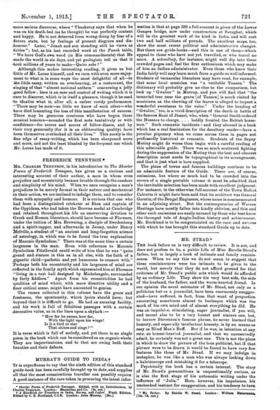FREDERICK TENNYSON.*
ME. CHARLES TENNYSON, in his introduction to The Shorter
Poems of Frederick Tennyson, has given us a curious and interesting account of their author, a man in whom even /prejudice and eccentricity became lovable through the candour and simplicity of his mind. When we once recognize a man's
.prejudices to be merely formal in their nature and mechanical in their action, we are inclined to indulge them, and to consider
them with sympathy and humour. It is curious that one who had been a distinguished cricketer at Eton and captain of the Oppidans, who had taken the Browne medal at Cambridge and retained throughout his life an unswerving devotion to Greek and Roman literature, should have become at Florence, under the tuition of Mrs. Browning, a disciple of Swedenborg .and a spirit-rapper, and afterwards in Jersey, under Henry Melville, a student of "an ancient and long-forgotten science of astrology, in which was to be found the true explanation of Masonic Symbolism." There was at the same time a certain largeness in the man. Even with reference to Masonic .Symbolism FitzGerald could write of him that he was "quite grand and sincere in this as in all else, with the faith of a gigantic child—pathetic and yet humorous to consort with."
Perhaps both his eccentricity and his largeness of mind are reflected in the family myth which represented him at Florence "living in a vast hall designed by Michelangelo, surrounded by forty fiddlers." Apart from his eccentricities he had
qualities of mind which, with more directive ability and a finer critical sense, might have amounted to genius.
The verses collected in this volume have the grace and freshness, the spontaneity, which lyrics should have; but beyond that it is difficult to go. He had an amazing facility,
and his work is full of felicitous passages with a certain decorative value, as in the lines upon a skylark :— " How far he seems, how far,
With the light upon his wings! Is it a bird or star That shines and sings ? "
It is verse which is full of melody, and yet there is no single poem in the book which can be considered as an organic whole.
They are improvisations, and to that are owing both their beauties and their defects.






























































 Previous page
Previous page